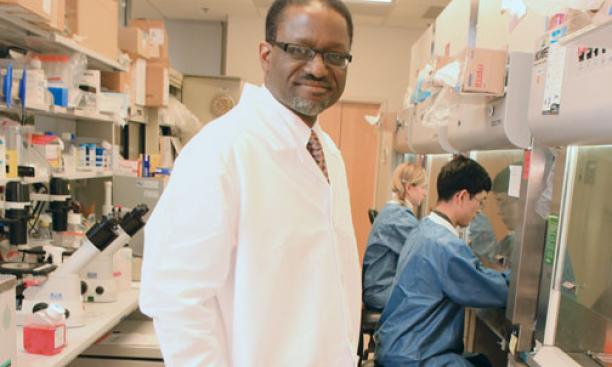

Offered the top job at the National Heart, Lung, and Blood Institute (NHLBI) last year, Gary Gibbons ’78 was attracted by the chance to steer an agency with a $3 billion budget for research on heart, lung, and blood disorders. But that wasn’t all. Gibbons, a cardiologist and scientist, also saw the position as an opportunity to address what he calls an “egregious” problem: a dearth of African-American scientists in biomedical research.
African-Americans make up only 1 percent of researchers receiving funding from the National Institutes of Health, NHLBI’s parent agency. A 2011 study found that black biomedical researchers are far less likely to win federal funding for their ideas than white scientists with similar research records. The study suggested several possible explanations, including the possibility that minorities may have fewer opportunities than others to learn the ropes of writing a successful research proposal, and that there could be unconscious racial bias by NIH peer reviewers.
As NHLBI director, Gibbons will help carry out an NIH plan to boost the number of black biomedical researchers. It will focus on what Gibbons calls the limited “pipeline” — a lack of minority scientists who pursue doctoral degrees — by offering promising minority college students scholarships and research experience. The agency also will connect young black scientists with seasoned minority researchers who can help them hone their research proposals.
Gibbons’ career has been shaped by his desire to pursue science and to reach out to underserved populations — a desire sparked by his mother, who helped found a church and a home for unwed teenage mothers while raising three children. “Community service and social justice were part of my family’s values,” says Gibbons, whose parents were teachers.
In medical school at Harvard, Gibbons first envisioned a career as a physician serving inner-city African-Americans. But a brief stint in a physiology lab turned into a two-year project and “infected me with the virus of wanting to pursue research,” he says.
Twelve years later, Gibbons was back at Harvard practicing cardiology and running his own lab. After three years, he moved to Morehouse School of Medicine, a historically black institution in Atlanta that wanted him to build its research program.
At Morehouse, Gibbons established a cardiovascular institute that explored the high rates of stroke and heart disease among African-Americans by examining both biological and sociological factors, such as poor access to health care and to fresh fruits and vegetables in urban areas — an approach Gibbons calls “from nucleotides to neighborhoods.”
He sees this “systems approach” as the future of research funded by NHLBI. “We need a portfolio of science that is able to nimbly integrate a variety of data to solve complex problems,” Gibbons says.
